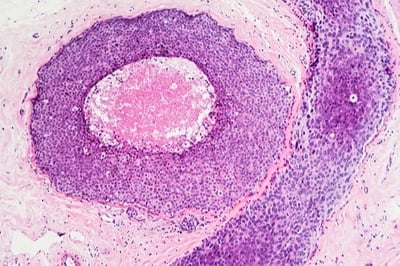FORCE's eXamining the Relevance of Articles for You (XRAY) program looks behind the headlines of cancer news to help you understand what the research means for you.
XRAY is a reliable source of hereditary cancer research-related news and information.
Learn more about the XRAY program
Keyword: hormone therapy
Relevance: Medium-High


Strength of Science: Medium-High


Research Timeline: Post Approval


Study : How breast cancer patients experience hormone therapy
Relevance: Medium-High


Strength of Science: Medium-High


Research Timeline: Post Approval


Most relevant for: Breast cancer patients taking or considering taking hormone therapy
Side effects from hormone therapy are a common reason that many men and women with hormone receptor-positive breast cancer stop treatment early. Some people never start hormone therapy. This study asked patients about their experiences with hormone (or endocrine) therapy. The results suggest that there may be ways to improve the number of patients who stick with therapy. Patients need better ways to manage hormone therapy-related side effects. (1/19/21)
Este artículo está disponible en español.
Read More
Relevance: Medium-High


Strength of Science: High


Research Timeline: Post Approval


Study : Hormone therapy and breast cancer risk after ovary removal in women with a BRCA1 mutation
Relevance: Medium-High


Strength of Science: High


Research Timeline: Post Approval


Most relevant for: Women with BRCA1 mutations who have had risk-reducing ovary removal and have never been diagnosed with breast cancer
Does hormone therapy (HT) alter the risk of breast cancer for woman carrying a BRCA1 mutation who have never been diagnosed with cancer? In this study, researchers showed that among women with BRCA1 mutations, HT use did not increase breast cancer rates for 10 years after ovary removal. More women taking combined estrogen plus progesterone developed breast cancer compared to those taking estrogen only, though this difference was not statistically significant. (9/7/18)

Study : Does eating soy affect the risk of death in breast cancer survivors?
Most relevant for:
Is eating soy safe for people who have had breast cancer? This topic has been controversial among health care providers, patients, and survivors for many years because research has yielded mixed results. Some studies suggest people who have been diagnosed with breast cancer should eat more soy products, while other studies recommend they eat less or avoid it altogether. Which should it be? Adding to this research is a new study that asked breast cancer survivors about their soy consumption before and after diagnosis. (4/27/17)
Read More
Study : Cancer treatment costs can vary widely
Most relevant for: People diagnosed with breast cancer
Healthcare providers cannot give their breast cancer patients information on chemotherapy treatment costs because not enough is known about the exact costs. New research finds that costs vary not only between different cancer treatments, but also between similar treatments, such as all treatments that target HER2+ breast cancer. (11/22/16)
Read More
Relevance: Medium


Strength of Science: Medium


Research Timeline: Human Research


Study : Breast cancer risk model updated for average risk women with genetic, lifestyle and environmental information
Relevance: Medium


Strength of Science: Medium


Research Timeline: Human Research


Most relevant for: Women at average risk for breast cancer
A number of factors are known to increase breast cancer risk, but some of these factors have not been included in models to predict breast cancer risk. This study looks at an updated model that includes some of these factors, such as genetics, smoking, and drinking. The goal of the model is to give women a more individualized breast cancer risk assessment. (6/29/16)
Read More
Relevance: Medium


Strength of Science: Medium


Research Timeline: Human Research


Study : Cellular diversity in tumors may predict survival for some types of breast cancer
Relevance: Medium


Strength of Science: Medium


Research Timeline: Human Research


Most relevant for: People diagnosed with breast cancer that is "high-grade" or aggressive
Some tumors are made up of many different types of cells, while others contain generally the same cell type. This study found that among people with high-grade breast cancer, those who have tumors made up of many different cell types have a lower 10-year survival rate than people with tumors containing only a single type of cells. This research is an early step towards developing a new test that can help physicians identify cancers that need more aggressive treatment, but more research is needed before it is ready for clinical use. (4/26/16)
Read More
Study : Weight gain associated with breast cancer survivorship
Most relevant for: Women diagnosed with early stage (1-3) breast cancer
Weight gain in breast cancer survivors can affect survival and quality-of-life. This study found that breast cancer survivors are more likely to gain weight than women of the same age who are at high risk, but have never been diagnosed with cancer. The study looked at which groups of survivors were more likely to gain weight. (8/24/15)
Read More